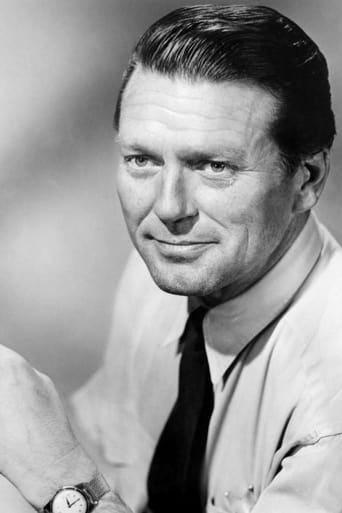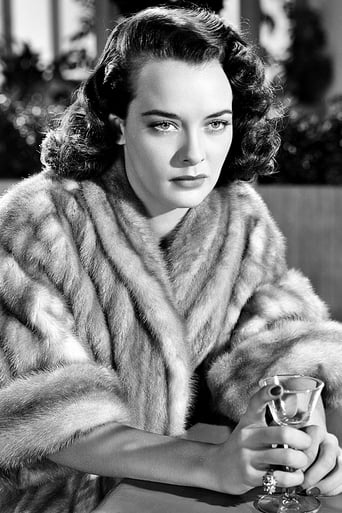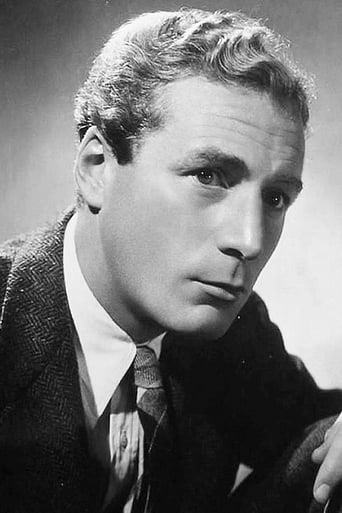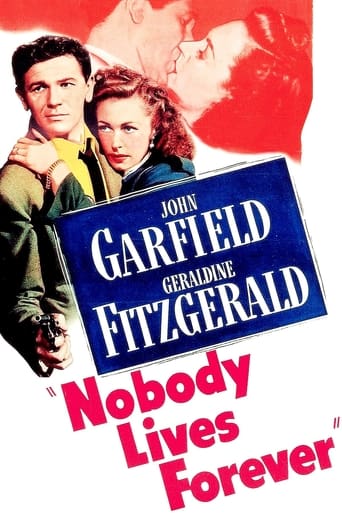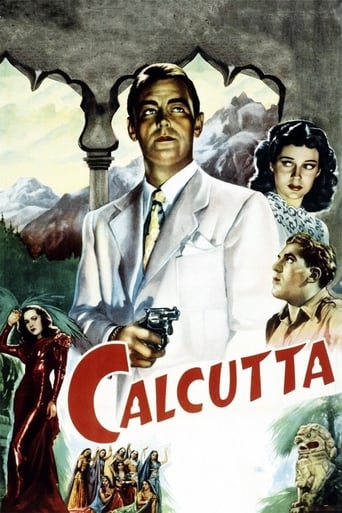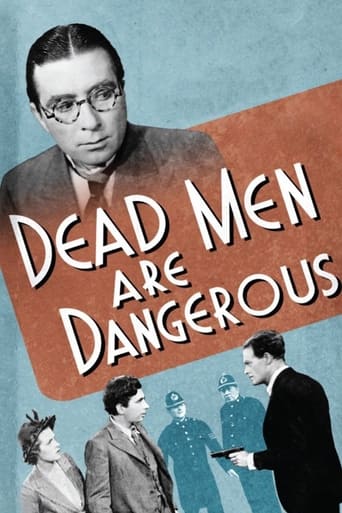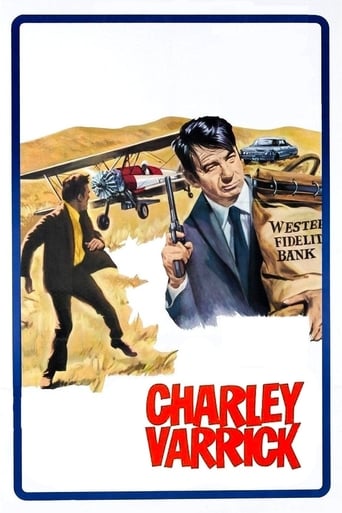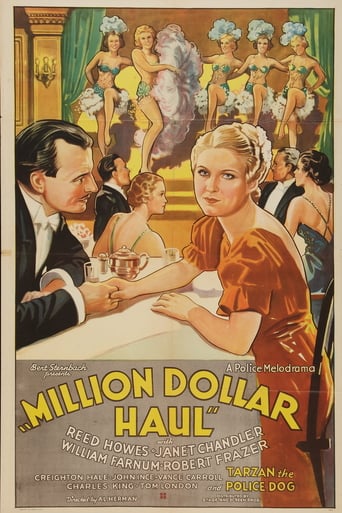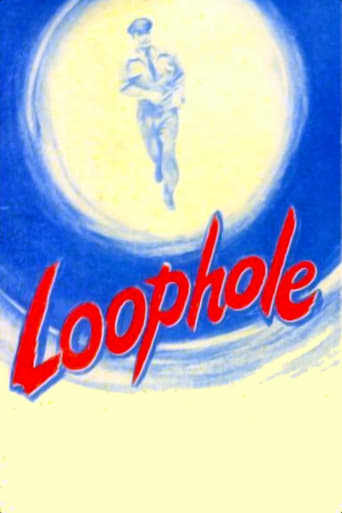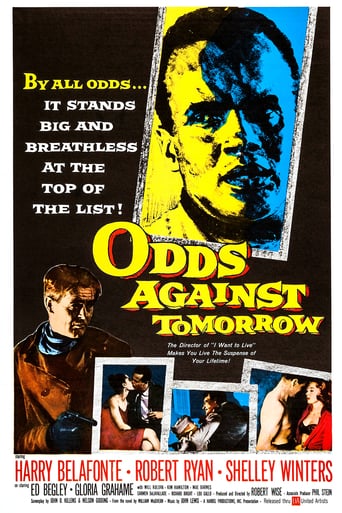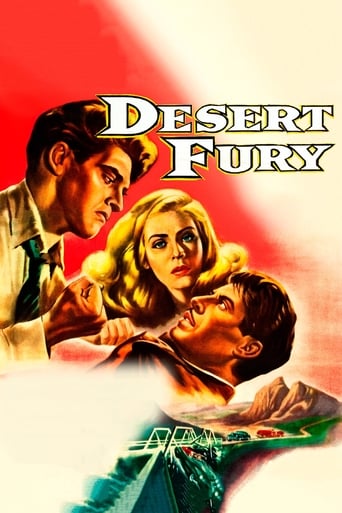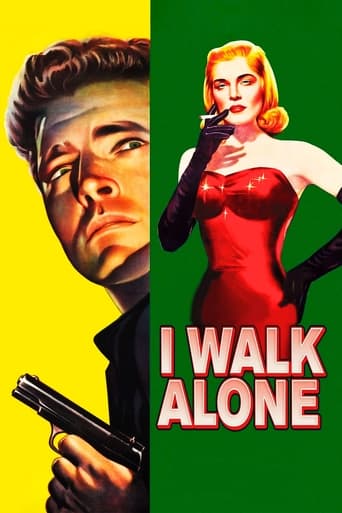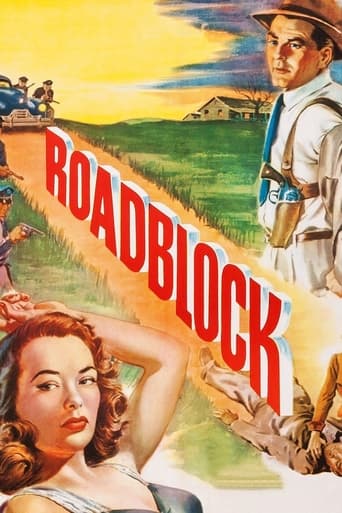
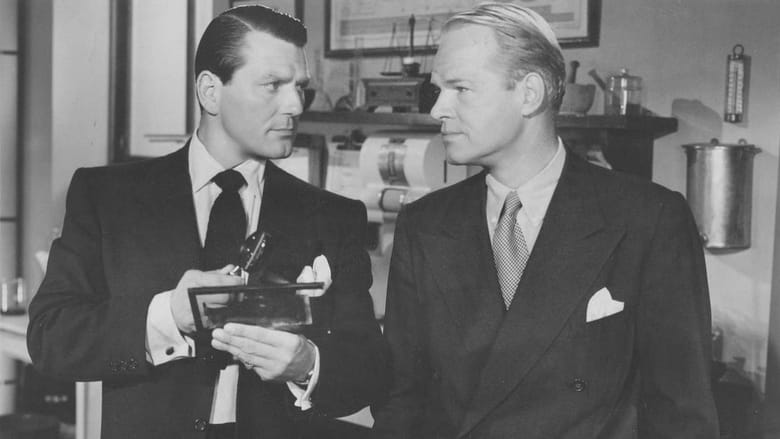
Roadblock (1951)
An insurance agent's greedy girlfriend with a taste for mink leads him to a life of crime.
Watch Trailer
Cast
Similar titles
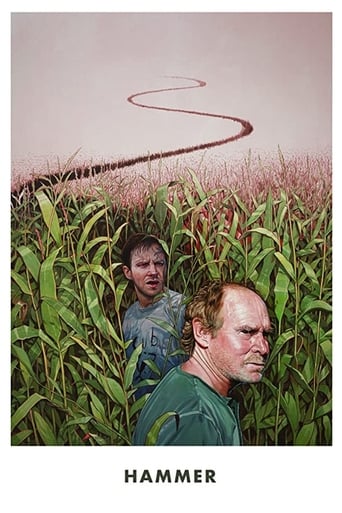
Reviews
Load of rubbish!!
hyped garbage
Don't listen to the negative reviews
I like movies that are aware of what they are selling... without [any] greater aspirations than to make people laugh and that's it.
Very entertaining film noir. After the staged 'murder' at the beginning to introduce the protagonist, we get something of a romantic comedy interlude. Then Roadblock deftly switches tracks to a deadly crime drama, thanks to the quick-kindling relationship between Joan Dixon's Diane and Charle's McGraw's Joe.Joe's determination to win Diane at any cost--ethically, morally, and legally, by proposing the heist to Webb--and her realization that she wants him just as he is, shows great plotting and pacing. And plenty of irony. Like other reviewers, I would have liked a bit of backstory on Joe and Diane; their simultaneous value reorientations involve too much suspension of disbelief.It is fascinating to see "Honest Joe" skulking around after the heist, his dream of easy money quickly churning into a noir nightmare. His future narrows down to a hopeless attempt to flee, literally walled in by the river bed's concrete embankments. His love for Diane, which propelled him into the underworld, becomes a crude gesture of raw survival, as he tosses her from his targeted car.Webb's an enigma, an interesting, rational, even perceptive character, who just happens to be a sociopathic criminal. It's a measure of the film's dramatic intensity that we can feel disappointed that Joe ends up being used by Webb, after Joe throws away his initial moral superiority.It's one thing to deal with Joe and Diane's sudden transformations, but some of the plot's logic is suspect as well. It should be obvious to Joe that he's going to be under a spotlight after the railroad heist, as Webb couldn't possibly have come up with the plan without insider help. It might've made more sense for Joe, instead of ignoring Diane's plea to call it off, confesses before it takes place. Then he's guilty of plotting a crime, but nothing happens as Webb and his guys are arrested.Still, Roadblock delivers a slick crime story with strong performances from McGraw and Dixon. A cool, long car chase to finish things up; not to mention the earlier scene as Webb's limo approaches the rendevous with Joe in one car, pulls up in another, and wrecks in a third. And that crash isn't in the mountains where the scene starts, but in the desert. Well, the point is that Webb's toast, in fine low-budget B movie style.
Charles McGraw was the toughest looking star and his gravelly voice was exactly what you would expect, but in this movie he proved he was a big pushover for a dame. The film started in an exciting way with a man witnessing a murder, then being held up. He claims he isn't so innocent and will split robbery proceeds of $100,000 50/50 if he is released. I won't give anything away but the film doesn't let up from there.Money is the theme - the lack of it, wanting it and what it can give you. "Honest" Joe Peters (Charles McGraw) is an insurance investigator who is quite content with his work and his pay - until he meets a beautiful icy stranger, Diane (Joan Dixon) at the airport. In an amusing scene she gets a cheaper ticket by posing as his wife, but it also means they have to share the same hotel room when the plane is stranded, due to bad weather. Diane is a model, and is looking for a man with wealth but there is something about Joe that she likes and he feels the same way about her. The next time they meet she is the mistress of a racketeer but she renews her friendship with Joe. Joe desperately wants to give Diane all the things he thinks she deserves and so approaches Kendall Webb (Lowell Gilmore) with plans he has for a mail robbery - he has inside information due to the insurance company he works for. Meanwhile, in the weakest part of the film Diane has changed her mind and is now content for Joe to be just an "Honest Joe" on a minimum wage. He can't get out of it and he and Diane honeymoon up in a mountain cabin as he awaits his share of the money to be delivered in a fire extinguisher. Somehow mountains and canoeing do not seem to come naturally to Diane, who, all through the film has worn a different fur coat in every scene!!! Joe's partner Harry (Louis Jean Heydt) smells a rat. It is his cabin and he had just bought a new fire extinguisher the year before. The stage is set for a gripping finale in the Los Angeles River (without the water!!!) There is a symbolic last scene as Diane totters away (on high heels) to an unknown future.Joan Dixon, who was an extremely beautiful Gene Tierney look-alike, was a protégé of Howard Hughes, but, alas, one of his failures. She left films in 1952 to marry but it didn't work out and the next year she was back at the studios trying to pick up the pieces - unfortunately she couldn't.
"Detour" is far more famous. And it's probably better. But this strange little movie moves as inexorably to a terrible end as "Detour" does.Charles McGraw was an excellent actor. He is fine here as "Honest Joe" Peters. He encounters Diane, a woman he never ought to have encountered, on a plane ride. He is a straight-arrow insurance investigator. She is looking for a rich man. She knows he isn't rich and she is not really painted as a villain.Joan Dixon plays Diane in a deadpan manner. She is pretty and has a soft, rather high voice. Maybe she was someone's idea of an Elizabeth Taylor lookalike. There are similarities.Everything is understated. Yet it's a tough movie. And it's powerful, and sad.
This film contains one film's most intriguing ideas: whether an honest man whose life and career are built around law-enforcement would throw away all his principles for love? Unfortunately, this film doesn't quite become good enough to make us care about this question.Joe Peters (played by Charles McGraw) is an insurance investigator. He and his partner Harry Miller (played by redoubtable character actor Louis Jean Heydt) are the best in the business. The film opens with them springing an elaborate but ingenious trap on a bank robber in order to trick the thief into revealing where he hid his stash. It's a well-written, well-acted, surprising opening scene and raises the viewer's expectations for the film.Sadly, these expectations are not met. Peters is detailed to get the money back to Los Angeles (although why they simply would not deposit the cash in a bank and have the funds wired to L.A. seems not to have occurred to the men). On the way, Peters runs into a woman, Diane (played with a sort of bored iciness by Joan Dixon), who pretends to be Peters' wife in order to con the airline into giving her a half-price ticket to L.A.One of the most important obstacles to overcome in a film like this is the viewer's disinclination to believe that the insurance investigator is as honest, principled and dedicated as he must be in order for his later moral fall to be believable and interesting. Unfortunately, "Roadblock" never tries to overcome this hurdle. Poor Peters immediately falls for the greedy, icy, selfish Diane -- although why is never made clear (Dixon's portrayal makes Diane completely unsympathetic, which in turns leads the viewer to be suspicious of Peters' sudden love for her). It is completely out of character. Had the film set up Peters' character better -- perhaps by giving us glimpses of how emotionally empty he was feeling, or perhaps by having him confront his loneliness -- "Roadblock" would have been a better picture.From this point on, however, "Roadblock" is simply a standard crime film. It cannot really be considered film noir, as it does not try to explore any of the seediness of the criminal world or give us insight into the "reality" of crime. In fact, the main criminal -- Kendall Webb, played by Lowell Gilmore as if he were sleepwalking through the role -- is a playboy with a wife in a penthouse in Vegas.Once Peters makes the decision to try to woo Diane (who refuses to marry for love, only money) by helping Webb knock over a bank and escape the clutches of the law (which, by the way, is seemingly non-existent in the world created by "Roadblock's" writers) and the insurance company (one wonders why the FDIC is never mentioned, although it existed at the time this film was made), the only thing worth paying attention to is the actual plotting and crime itself. I have to admit that this is a tightly-written little crime drama, with a believable heist that is well executed by the thieves and which unravels (as it must) due to solid detective work rather than chance and coincidence (as in so many lesser films).But the heart of the film -- Peters' moral collapse, the effect this has on his personality (he becomes angry at work, which is a plot element stolen from "Double Indemnity") and marriage to Diane, and the lengths to which he goes to keep his ill-gotten gains (and hence Diane) -- are not nearly as well-written or acted. Charles McGraw (who had a long and fairly illustrious career as a character actor) turns in a good performance as Peters. His desperation and agony over the though of losing Diane is palpable and subtlely acted, and he has a terrific way of acting with his face (check out the scene where he stages Webb's murder and has to watch the body burn) that really helps lift the film from C-grad to B-grade. But it's not enough to overcome the stolid acting by Dixon and Gilmore.The film's terribly predictable ending -- the bad guys get their comeuppance, the woman abandons her greed and falls in love, the best friend is betrayed, etc. -- doesn't help, either. There's nothing special about Nicholas Musuraca's cinematography, except for the obsessiveness with medium shots -- and it is nowhere near as inspired as his work on "The Magnificent Ambersons," "Deadline at Dawn," or "The Bachelor and the Bobby-Soxer." Another 45 minutes of character development at the front of the film would have helped set up Peters much better and given us more interest in the character of Diane.
